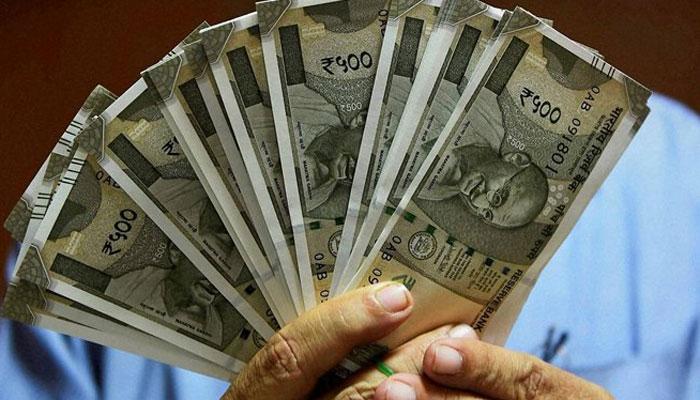Will cash be king again?
Even as the Modi government prepares the Financial Resolution and Deposit Insurance (FRDI) Bill to strengthen the banking system, Indians fear losing their savings.
With mercury set to dip further in Delhi, the cold wave has begun to engulf North India. But the more chilling news is that people fear they might lose their savings as the Modi government plans to introduce the Financial Resolution and Deposit Insurance (FRDI) Bill in the Winter Session of Parliament beginning Friday.
Messages and videos going viral on social media claims that the bill enables the government to use the depositors’ funds to bail out banks. Both Prime Minister Narendra Modi and his finance minister Arun Jaitley have dismissed these claims as mere rumours.
“There have been lot of rumours about the FRDI. The government is doing all it can to secure the deposits of customers. But the rumours are exactly opposite to what the government is doing. Organisations, such as Federation of Indian Chambers of Commerce and Industry (FICCI) have to figure out ways to balance the voices of the government, industry and the common man,” Modi said while addressing the annual general meeting of industry chamber, FICCI, in the capital.
Depositors worried
This is due to a controversial ‘bail-in’ provision that allows banks to use depositors’ money for resolution of bad loans due to corporate defaults to save banks and other financial institutions. So, in the event of a collapse of a financial institution, such as a bank, its creditors and depositors will have to absorb some of the losses, as per Section 52 of the Bill. So far, the ‘bailout’ measure is used in such cases and the government steps in to save banks.
Depositors worry that their hard-earned savings left in the bank could be deducted or turned into fixed deposits without any prior notice. At present, deposits up to INR 100,000 (~EUR 1,323) are insured by the Deposit Insurance and Credit Guarantee Corporation, while the rest can be forfeited in case of a bank failure. The new Bill has not specified the amount of insured deposits yet.
Depositors are concerned as it comes a year after the demonetisation move by Modi on November 8, 2016, banning INR 500 (~EUR 6) and INR 1,000 (~EUR 13) notes.
What is FDRI?
First mentioned by Jaitley in his budget speech in 2016-17, the FDRI Bill, which was introduced in the Lok Sabha on August 11, 2017, is under consideration by the Joint Parliamentary Committee (JPC). The panel is consulting all the stakeholders on the provisions of the legislation.
The Bill proposes ‘bail-in’ as one of the methods of resolution, where the banks issue securities in lieu of the money deposited. In the past, the bail-in efforts had largely worked against depositors.
Along with the Insolvency and Bankruptcy Code (IBC), re-capitalisation of PSU banks, and Foreign Direct Investment (FDI) in insurance, this Bill is touted to be a landmark reform in the financial sector.
A banking sector observer wonders why India needs this new law when India has the IBC to take care of liquidation of banks.
The banking sector too is up in arms against the Bill.
C H Venkatachalam, general secretary, All India Bank Employees’ Association (AIBEA), who appeared before the JPC told Media India Group: “Unlike banks in other countries, the deposits in India are driven by savings and not investments. Hence, we do not need laws, such as in Cyprus where the banks were dependent on foreign deposits. Once foreign investors withdrew the banks there collapsed.”
Global move
In the wake of the 2008 financial sector crisis in the United States of America (US) and other countries, the governments there had to bailout many failed banks with the tax-payers’ money, and the Financial Stability Board (FSB) came up in 2009, where the G-20 countries are members.
The FSB had made framework policies and guidelines to deal with banking financial institutions in the eventuality of their failures. As India is also a part of G-20 and FSB, the government brought in this legislation.
In Cyprus, depositors lost almost 50 pc of their savings when a bail-in was implemented.
Besides Cyprus, Canada, New Zealand, US, the United Kingdom (UK) and Germany have also introduced similar legislation that empower the governments in these countries with the option to freeze and seize bank deposits above a certain level.
Currently, 2,125 commercial and co-operative banks are covered under the Deposit Insurance and Credit Guarantee Corporation. According to Venkatachalam, between 1913 and 1960, nearly 1,600 private banks failed in India, and closed down.
Depositors lost all their money kept in these banks. Hence, the All India Bank Employees Association(AIBEA) took up the issue in Parliament and an amendment was made to the Banking Regulation Act in 1960, by which any bank failing will be put on moratorium and merged with another bank. Since then, banks making losses have been merged with big banks.
Mamta Pathania, co-project director at the National Consumer Helpline, and faculty member at the Indian Institute of Public Administration, had observed in a business daily that: “the provisions of the Bill have been creating a lot of confusion in the minds of the people. Ultimately, bank deposits are considered the safest investment option by any investor.”
As the issue worried depositors, finance minister Jaitley tweeted: The Financial Resolution and Deposit Insurance Bill, 2017 is pending before the Standing Committee. The objective of the government is to fully protect the interest of the financial institutions and depositors.”
It is to be seen how the government introduces the legislation without losing the confidence of Indian depositors in the wake of strong opposition to the Bill.










